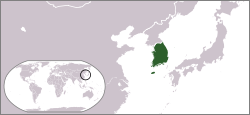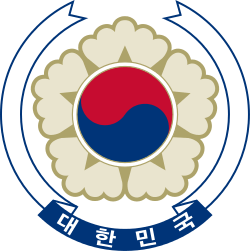Fifth Republic of South Korea
| Republic of Korea | ||||||
| 대한민국 大韓民國 | ||||||
| ||||||
| ||||||
 | ||||||
| Capital | Seoul | |||||
| Languages | Korean | |||||
| Government | Conservatist republic Under a nationalist-liberalist military dictatorship | |||||
| President | Chun Doo-hwan | |||||
| Historical era | Cold War | |||||
| - | Established | 3 March 1981 | ||||
| - | Disestablished | 19 December 1987 | ||||
Part of a series on the |
||||||||||||||||
|---|---|---|---|---|---|---|---|---|---|---|---|---|---|---|---|---|
| History of South Korea | ||||||||||||||||
 | ||||||||||||||||
|
||||||||||||||||
| South Korea portal | ||||||||||||||||
The Fifth Republic of South Korea was the government of South Korea from 1979 to 1987, replacing the Fourth Republic of South Korea. Throughout this period, the government was controlled by Chun Doo-hwan, a military colleague of the assassinated president Park Chung-hee. This period saw extensive efforts at reform. It laid the foundations for the relatively stable democratic system of the subsequent Sixth Republic in 1987.
History
After the assassination of Park by Kim Jae-kyu in 1979, a vocal civil society emerged that led to strong protests against authoritarian rule. Composed primarily of university students and labor unions, protests reached a climax after Major General Chun Doo-hwan's 1979 Coup d'état of December Twelfth and declaration of martial law on May 17. The expanded martial law closed universities, banned political activities and further curtailed the press. The event of May 17 means the beginning of another military dictatorship.
On May 18, 1980, a confrontation broke out in the city of Gwangju between civilians and armed forces, with the military forces winning out nine days later on May 27. Immediate estimates of the civilian death toll ranged from a few dozen to 2000, with a later full investigation by the civilian government finding 606 deaths (see: Gwangju Massacre).
On May 17, Chun Doo-hwan forced the Cabinet to expand martial law to the whole nation, which had previously not applied to Jeju-do. The expanded martial law closed universities, banned political activities and further curtailed the press. Chun assumed the presidency by the event of May 17, triggering nationwide protests demanding democracy, in particular in the city of Gwangju, where Chun sent special forces to violently suppress the Gwangju Democratization Movement. Chun subsequently created the National Defense Emergency Policy Committee and took the presidency according to his political plan. Public outrage over the killings consolidated nationwide support for democracy, paving the road for the first democratic elections in 1987.
See also
- History of Korea
- History of South Korea
- Korean Air Lines Flight 007
- List of Korea-related topics
.svg.png)